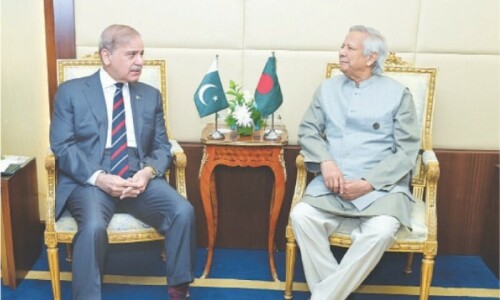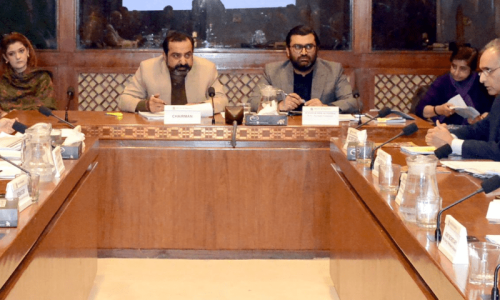
WASHINGTON: The International Monetary Fund projected on Thursday 3-3½ per cent GDP growth for Pakistan during the current fiscal year, lower than the 4.2pc target set by the government.
The report by an IMF mission which visited Pakistan this week noted that the energy problems facing the country were perhaps “the largest single impediment” to higher economic growth and were a major factor behind macroeconomic imbalances.
“Pakistan faces a challenging economic outlook. GDP growth in 2012/13 is projected to be in the 3-3½ pc range, which needs to accelerate in order to absorb the growing labour force,” said a statement issued in Washington.
The IMF reported earlier that Pakistan’s fiscal deficit reached 8.5 pc of the gross domestic product during the last financial year, almost twice the official target.
The IMF warned that Pakistan was unlikely to meet the current fiscal year’s target of 4.7 pc.
It noted that inflation had fallen recently but was expected to be “back in double digits by the middle of next year if corrective measures are not taken to reverse monetary financing of the fiscal deficit”.
The report also warned that Pakistan’s external position was weakening.
While the current account deficit was not large by international standards, financial flows had weakened and central bank reserves had fallen.
“Decisive and farsighted action is needed to address this challenging outlook,” said the statement issued on the conclusion of post-programme monitoring discussions with the Pakistani authorities.
“Underlying inflation remains high and represents a regressive tax that disproportionately hurts the poor”.
The IMF mission noted that the ultimate goal of the State Bank of Pakistan should be to bring inflation down significantly by using its policy tools.
“Reduced recourse to central bank financing by the government is also critical for a durable reduction in inflation. While the banking sector is well-capitalised and profitable, the level of non-performing loans is relatively high”.
The mission reminded Pakistani authorities that addressing macroeconomic imbalances would help support higher growth and stressed that a comprehensive approach to reform was needed to tackle the problems the country faced.
The mission underlined the lack of full cost recovery, resulting in costly and untargeted subsidies, governance and efficiency difficulties in energy distribution, regulatory inadequacies, and insufficient investment in new energy production as some of the factors having a negative impact on the national economy.
The IMF team noted that tackling the energy problems would also benefit macroeconomic stabilisation. In addition, other structural reforms were also needed to boost growth, including measures to enhance the business climate and to restructure public sector enterprises beyond the energy sector.
An IMF team led by Jeffrey Franks visited Dubai and Islamabad from Sept 26 to Oct 3 for talks with Pakistani authorities. Such discussions are standard in countries that have recently had large IMF arrangements.
Discussions on economic policy focused on diligent management of the budget deficit, reducing inflation, and structural reforms.
The government and the IMF team agreed on the need to contain the budget deficit to help lower inflation, reduce crowding out of private sector credit and ensure debt sustainability.
“In our view this requires significant corrective measures; the fiscal deficit is otherwise likely to exceed the budget target by a significant margin,” the IMF warned.









































Dear visitor, the comments section is undergoing an overhaul and will return soon.